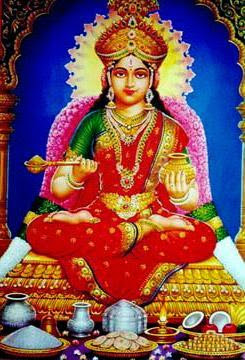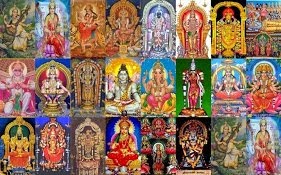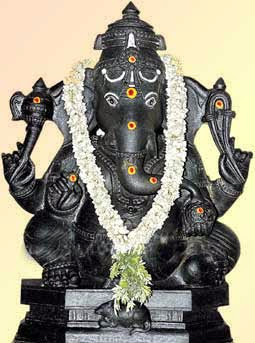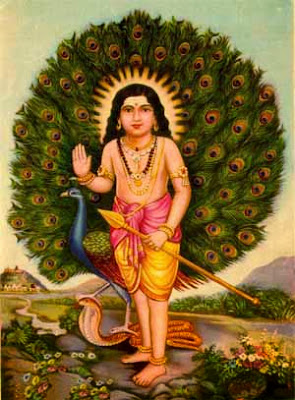 LALITHA SAHASRANAMAM
LALITHA SAHASRANAMAMAsyashrilalita sahasranama stotras mahamantrasya,
vashinyadi vagdevata
Rushayah anushtup chandaha shree lalita parameshari devata
shrimadvagbhava
Kutetibijam madhyakuteti shaktih shaktinyasam karanyasancha
kuryat mama
Shree lalita parameshari prasada sidhyardhe jape viniyogah
DHYANAM
Sinduraruna vigragam, trinayanam, manikyamaoli spharat
Taranayaka shekharam, smitamukhim, aapinavakshoruham
Panibhyam, alipurnaratna chashakam, raktotpalam bibhratim
Saomyam ratna ghatasdha raktacharanam
Dhyayetparamanbikam
Arunam karuna tarangitakshim
Dhruta pashankusha pushpa banachapam
Animadibhi ravrutam mayukhai
Rahamityeva vibhavaye, bhavanim
Dhyayetpadmasanasdham vikasita
Vadanam padmapatrayatakshim
Hemabham pitavastram karakalita
Lasadhemapadmam varangim
Sarvalankarayuktam satata mabhayadam
Bhaktanamram bhavanim
Shree vidyam shantamurtim sakala suranutam
Sarvasanpatpradatrim
Sakunkuma vilepana malikachunbi sasturikam
Samandahasi tekshenam sasharachapa pashankusham
Asheshajana mohini marunamalya bhushanbaram
Japakusuma bhasuram japavidhao smaredanbikam
Sree-mata shree maha-ragyni shreematsinha-saneshvaree
Chidagni kunda-sanbhuta deva-karya samudyata – 1
Udyadbanu saha-srabha chatur-bahu saman-vita
Raga-svarupa pashadya krodha-karanku-shojvala – 2
Mano-rupekshu kodanda pancha tanmatra sayaka
Nijaruna prabha-pura majabhramhanda mandala – 3
Chanpaka shoka punnaga saogandhika lasatkacha
Kuruvinda mani shrenee kanatkotira mandita – 4
Ashtami chandra vibhraja dalikasdhala shobhita
Mukha-chandra kalankabha mruga-nabhi visheshaka – 5
Vadanas-mara mangalya gruhatorana chillika
Vaktra-lakshmi pari-vaha chalan-minabha lochana – 6
Nava-chanpaka pushpabha nasa-danda virajita
Tarakanti tiraskari nasa-bharana bhasura – 7
Kadanba manjari klupta karna-pura mano-hara
Tatanka yugali-bhuta tapa-nodupa mandala – 8
Padma-raga shila-darsha pari-bhavi kapolabhuh
Nava-vidruma binbashree nyakkari radanachada – 9
Shudha vidyankurakara dvijapankti dvayojvala
Karpura-vitikamoda samakarsha digantara – 10
Nijasanlapa madhurya vinirbhastitakachapi
Mandasmita prabhapura majatkamesha manasa – 11
Anakalita sadrusya chubuka shree virajita
Kamesha bada mangalya sutra-shobhita kandhara – 12
Kanakangada keyura kamaniya bhujanvita
Ratnagrai-veya chintakalola mukta phalanvita – 13
Kameshvara prema-ratna mani prati-panastani
Nabhyalavala romali lata phala kuchadvaei – 14
Lakshya romalata bharata samunneya madhyama
Stana-bhara dalanmadhya patta-bandha-valitraya – 15
Arunaruna kaostunbha vastra bhasvatkatitati
Ratna kinkinikaramya rashanadama bhushita – 16
Kamesha-gynata saobhagya marda-voru dvayanvita
Manikya makuta kara janudvaya virajita – 17
Endra-gopa parikshipta smaratunabha janghika
Guda-gulpha kurma prushtajaeishnu prapadanvita – 18
Nakhadidhiti sanchanna samajana tamoguna
Padadvaya prabhajala parakruta saroruha – 19
Shinjanamani mangira mandita shrepadanbuja
Marali mandagamana maha-lavanya shevadhih – 20
Sarvaruna navadyangi sarvabharana bhushita
Shiva-kameshvarankasdha shiva svadhinavallabha – 21
Sumeru shrunga-madhyasdha shreemannagara naeika
Chintamani gruhantahsdha pancha bramga sanasdhita – 22
Mahapadmatavi sansdha kadanba vanavasinee
Sudha sagara madhyasdha kamakshi kamadaeinee -23
Devarshigana sanghata stuyamanatma-vaibhava
Bhandasura vadhodyukta-shakti-sena samanvita – 24
Sanpatkari samaruda sindhura vrajasevita
Asvarudadhishtitasva koti bhiravruta – 25
Chakra-raja radharudha sarva-yudha parishkruta
Geya-chakra radha-ruda mantrini parisevita – 26
Kiri-chakra radha-rudha dandanadha puraskruta
Jvalamalinikakshipta mahni prakara madhyaga – 27
Bhandasainya vadhodyukta shakti vikrama harshita
Nitya parakra matopa nireekshana samutsaka – 28
Bhanda-putra vadhodyukta balavikrama nandita
Mantrinyanba virachita vishangavadhatoshita – 29
Vishukra pranaharana varahi viryanandita
Kameshvara mukhaloka kalpita shreganeshvara – 30
Maha-ganesha nirbhinna vighnayantra praharshita
Bhanda-surendra nirmukta shastra pratyastra varshini – 31
Karanguli nakhotpanna narayana dashakrutih
Mahapashupatastragni nirdagdha surasainika – 32
Kameshvarastra nirdagda sabhandasura shunyaka
Bramhependra mahendradi devasansdhutavaibhava -33
Haranetragni sandagdakama sanjivanaoshadhih
Shreemadvagbhavakutaika svarupa mukhapankaja -34
Kantadhah-kati paryanta madhyakuta svarupinee
Shakti-kutaikatapanna katyadhobhaga dharinee – 35
Mulamantratmika mulakutatraya kalebara
Kulamrutaikarasika kulasanketapaline – 36
Kulangana lulantasdha kaolinee kulayogini
Akula samayantasdha samayachara tatpara – 37
Muladharaika nilaya bramhagrandhi vibhedini
Manipurantarudita vishnugrandhi vibhedine – 38
Aagyna-chakrantaralasdha rudra-grandhi vibhedini
Sahasraranbujaruda sudhasarabhivarshinee – 39
Tatillata samaruchi shatchakropari sansdhita
Mahashakti-kundalini bisatantu taniyasi – 40
Bhavani bhavanagamya bhavaranya kutarika
Bhadrapriya bhadra-murti rbhakta-saobhagyadaeini -41
Bhakta-praya bhakta-gamya bhakti-vashya bhaya-paha
Shanbhavi sharadaradhya sharvani sharmadaeini – 42
Shankari shrikari sadhvi sarachandra nibhanana
Shatodari shantimati niradhara niranjana – 43
Nirpepa nirmala nitya nirakara nirakula
Nirguna nishkala shanta nishkama nirupaplava – 44
Nityamukta nirvikara nisprapancha nirashraya
Nitya-shudha nitya-budha niravadya nirantara – 45
Nishkarana nishkalanka nirupadhirnirishvara
Niraga ragamadhani nirmada madanashini – 46
Nishchinta nirahankara nirmoha mohanashinee
Nirmama mamatahantri nishpapa papanashini – 47
Nishkrodha krodhashamani nirlobha lobhanashini
Nisandhaya sanshayaghni nirbhava bhavanashini – 48
Nirvikalpanirabadha nirbheda bhedanashini
Nirnasha mrutyumadhani nishkriya nishparigraha – 49
Nistula nilachikura nirapaya niratyaya
Durlabha durgama durga dukha-hantri sukhaprada – 50
Dushta-dura duracharashamani doshavarjita
Sarvagyna sandrakaruna samanadhika varjita – 51
Sarva-shaktimaei sarvamangala sadgatiprada
Sarveshvari sarvamaei sarvamantrasvarupini – 52
Sarva-yantratmika sarvatantrarupa manonmani
Mahishvari mahadivi mahalakshmi rmrudapriya – 53
Maharupa mahapujya mahapataka nashini
Mahamaya magasatva mahashaktirmaharatih – 54
Mahabhoga mahaishvarya mahavirya mahabala
Maha-bhudirmahasirdhirmahayogeshvareshvari – 55
Mahatantra mahamantra mahayantra mahasana
Mahayaga kramaradya mahabhairava pujita – 56
Maheshvara mahakalpa mahatandava sakshini
Mahakamesha mahishi mahatripurasundari – 57
Chatushashtyupacharadya chatushashti kalamaei
Mahachatushashtikoti yogini ganasevita – 58
Manuvidya chandra vidya chandramandala madhyaga
Charu rupacharuhasa charuchandra kaladhara – 59
Charachara jagannadha chakraraja niketana
Parvati padmanayana padmarga samaprabha – 60
Panchapretasanasina panchabramha svarupini
Chinmaei paramananda vigynanaghanarupini – 61
Dhyanadhyatru dhyeyarupa dharmadharma vivarjita
Vishvarupa jagarini svapanti taijasatmika -62
Supta pragynatmika turya sarvavasdhavivarjita
Prushtikartri bramharupa goptri govindarupini – 63
Sanharini rudrarupa tirodhanakarishvari
Sadashivanugrahada panchakrutya parayana – 64
Bhanumandala madhyasdha bhairavi bhagamalini
Padmasana bhagavati padmanabha sahedari – 65
Unmesha nimishotpanna vipanna bhuvanavalih
Sahasrashirshavadana sahasrakshi sahasrapat – 66
Aabramhakitajanani varvashrama vidhaeini
Nijagyna rupanigama punyapunya phalaprada – 67
Shruti simanta sirurikruta padabja dhulika
Sakalagama sandoha shukti sanputa maoktika – 68
Purushardhaprada purna bhogini bhuvaneshvari
Anbika nadi nidhana paribramhendra sevita – 69
Narayani nadarupa namarupa vivarjita
Hrinkari hrimati hrudya heyopadeyavarjita – 70
Rajarajarchita ragyni ramya rajivalochana
Ranjani ramani rasya ranarkinkini mekhala – 71
Rama rakenduvadana ratirupa ratipriya
Rakshakari rakshasaghni rama ramanalanpata – 72
Kamya kamakalarupa kadanba kusumapriya
Kalyani jagatikanda karunarasasagara – 73
Kalavati kalalapa kanta kadanbari priya
Varada vamanayana varunimadavihvala – 74
Vishvadhika vidavidya vindhyachala nivasini
Vidhatri vidajanani vishnu maya vilasini – 75
Kshetra-svarupa kshetreshi kshetrakshetragynapalini
Kshaya-vrudhi vinirmukta kshetrapala smarchita 76
Vijaya vimala vandya mandaru janavatsala
Vagvadini vamakeshi vahni mandala vasini – 77
Bhaktimatkalpalatika pashupasha vimochani
Sanhruta sheshapashanda sadachara pravartika – 78
Tapatrayagni santapta samahladana chandrika
Tatuni tapasaradhya tanumadhya tamo-paha – 79
Chiti statpadalakshyardha chidekarasa rupini
Svatyanandalavibhuta bramhadyananda santatih – 80
Parapratyakchitirupa pashyanti paradevata
Madhyama vaikharirupa bhaktamanasa hansika – 81
Kameshari prananadi krutagyna kamapujita
Shrungararasa sanpurna jaya jalandharasdhita – 82
Odyana pita nilaya nindu mandala vasini
Rahoyaga kramaradhya rahastarpana tarpata – 83
Sadyah prasadini vishvasakshini sakshivarjita
Shadanga devata yukta shadgunya paripurita – 84
Nityaklinna nirupama nirvana sukhadaeini
Nitya shodashika rupa shree kantardha sharirini – 85
Prabhavati prabha rupa prasidha parameshari
Mulaprakruti ravyakta vyaktavyakta svarupini – 86
Vyapini vividhakara vidya vidya svarupini
Mahakameshanayana kumudahlada kaomudi – 87
Bhaktahardhatamobheda bhanumadbanu santatih
Shivaduti shivaradhya shivamurtishivankari – 88
Shivapriya shivapara shishteshta shishta-pujita
Aprameya svaprakasha manovachamagochara – 89
Chichakti shchetanarupa jadashakti jadatmika
Gayatri vyahruti sandhya dvijabrunda nishemita – 90
Tatvasana tatvamaei panchakoshantarah sdhita
Nisima mahima nitya-yaovana madashalini – 91
Madagharnita raktakshi madapatala gandabhuh
Chandana drava digdhangi chanpeya kusumapriya – 92
Kushala komalakara kurukulla kuleshvari
Kulakundalaya kaolamarga tatpara sevita – 93
Sumara gananadhanba tushtih pushtirmati dhrutih
Shanti spastimati mantirnandini vignanashini – 94
Tejovati trinayana lolakshi kamarupini
Malini hansini mata malayachala vasini – 95
Sumukhi nalini subhru shobhana suranaeika
Karikanti kantimati kshobhini sukshmarupini – 96
Vajreshvari vamadevi vayovasdha vivarjita
Sideshvari sidhavidya sidhamata yashasvini – 97
Vishudichakra nilaya raktavarna trilochana
Khatvangadi praharana vadanaika samanvita – 98
Payasanna priya tvaksdha pashuloka bhayankari
Amrutadi mahashakti sanvruta dakinishvari – 99
Anahatabjanilaya shyamabha vadanadvaya
Danshtrojvalakshamaladi dhara rudhira sansdhita – 100
Kalaratryadishaktyao-ghavruta snigdhao-dana priya
Mahavirendra varada rakinyanba svarupini – 101
Manipurabja nilaya vadanatraya sanyuta
Vajradikayudhopeta dayaryadibhiravruta – 102
Rakta-varna mansanishta gudanna pritamanasa
Samsta bhakta sukhada lakinyanba svarupini - 103
Svadhishtananbujagata chaturvaktra manohara
Shuladyayudha sanpanna pitavarna tigarvita – 104
Medhonishta maduprita bandinyadi samanvita
Dadyannasakta hrudaya kakini rupadharini – 105
Muladharanbujarudha panchavaktrasdhi sanpdhita
Ankushadi praharana varadadi nishevita – 106
Mudgaodanasaktachitta sakinyanba svarupini
Aagynachakrabja nilaya shuklavarna shadanana – 107
Majasansdha hansavati mukhyashakti samanvita
Haridranai karasika hakinirupa dharini – 108
Sahasradala padmasdha sarvavarnopashobhita
Sarvayudhadharashukla sansdhita sarvatomukhi – 109
Sarvaodana pritachitta yakinyanba svarupini
Svahasvadha mati rmedha shrutih smrutiranuttama – 110
Punyakirtih punyalabhya punyashravana kirtana
Pulomajarchita bandhamochani bandhuralaka – 111
Vimarsharupini vidya viyadadi jagatprasuh
Sarvavyadhi prashamani sarvamrutyu nivarini – 112
Agraganya chintyarupa kalikalmashanashini
Katyayani kalahantri kamalaksha nishevita – 113
Tanbulapuritamukhi dadimikusumaprabha
Mrugashi mohini mudhya mrudani mitrarupini – 114
Nityatrupta bhaktanidhi rniyantri nikhileshvari
Maityradi vasanalabhya mahapralayasakshini – 115
Parashaktih paranishta pragynana ghanarupini
Madhvipanalasa matta matrukavarna rupini – 116
Mahakailasa nilaya mrunala mrududorlata
Mahaniya dayamurti rmahasamrajyashalini – 117
Aatmavidya mahavidya shreevidya kamasevita
Shree shodashaksharividya trikuta kamakotika – 118
Katakshakinkaribhuta kamala kotisevita
Shirasdhita chandranibha phalasdhendra dhanuh prabha – 119
Hrudayasdha ravi prakhya trikonantara dipika
Dakshayani daityahantri dakshayagyna vinashini – 120
Darandolita dirghakshi darahasojvalanmukhi
Gurumurtirgunanidhi rgamata guhajanmabhuh – 121
Deveshi dandanitisdha daharakasha rupini
Pratipanmukhyarakanta tidhimandala pujita – 122
Kalatmika kalanadha kavyalapa vinodini
Sachamara ramavani savyadakshini sevita – 123
Aadishakti rameyatma parama pavanakrutih
Anekakoti bramhanda janani divyavigraha – 124
Klinkari kevala guhyakaivalya padadaeini
Tripura trijagadvandya trimurti stridasheshvari – 125
Tryakshari divyagandhadya sindura tilakanchita
Uma shailendra tanaya gaori gandharava sevita -126
Vidhvagarbha svarnagarbha varada vagadhishvari
Dhyanagamyaparichedya gynanada gynanavigraha – 127
Sarvavedanta sanvedya satyananda svarupini
Lopamudrarchita lilaklupta bramhanda mandala – 128
Adrushyadrushyarahita vigynatri vedyavarjita
Yogini yogada yogya yoganandayugandhara – 129
Echashakti gynashakti kriyashakti svarupini
Sarvadhara supratishta sadasadrupadharini – 130
Ashtamurtirajajaitri lokayatra vidhaeini
Ekakini bhumarupa nirvaita dvaitavarjita – 131
Annada vasudha vrudha bramhatmaikya svarupini
Bruhati bramhani bhramhi bramhananda balipriya – 132
Bhasharupa bruhatsena bhavabhava vivarjita
Sukharadhya shubhakari shobhana sulabhagatih – 133
Rajarajishvari rajyadaeini rajyavallabha
Raja tkrupa rajapita niveshitanija shrita – 134
Rajyalakshmih koshanadha chaturanga baleshvari
Samrajyadaeini satyasandha sagaramekhala – 135
Dikshita daityashamani sarvaloka vashankari
Sarvardhadatri savitri sachidananda rupini – 136
Deshakala parichinna sarvaga sarvamohini
Sarsvati shastramaei guhanba guhyarupini – 137
Sarvopadhivinirmukta sadashiva pativrata
Sanpradayeshvari sadhvi gurumandala rupini – 138
Kulottirna bhagaradhya maya madhumatimahi
Gananba guhyakaradhya komalangi gurupriya – 139
Svatantra sarvatantreshi dakshanamurtirupini
Sanakadi samaradhya shivagynana pradaeini – 140
Chitkala nandakalika premarupa prinankari
Namaparayana prita nandivida nateshvari – 141
Midhya jagadadhishtana muktida muktirupini
Lasyapriya layakari sajja ranbhadi vandita – 142
Bhavadava sudhavrusthih paparanya davanala
Daorbhagya tula vatula jaradhvanta raviprabha- 143
Bhagyabhi chandrika bhakta chittakeki ghanaghna
Rogaparvatadanbholi rmrutyudaru kutarika -144
Mahishvari mahakali mahagrasa hamashani
Aparna chanidika chandamundasura nishudini – 145
Ksharakshatmika sarvalikeshi vishadharini
Trivargadatri subhaga tryanbaka trigunatmika – 146
Svargapavargada shudha japapushpa nibhakrutih
Ojovati dyutidhara yagynarupa priyavrata – 147
Duraradhya duradhatsha patali kusumapriya
Hamati merunilaya mandara kusumapriya – 148
Viraradhya viradrupa viraja vishatomukhi
Pratyagrupa parakasha pranada pranarupini – 149
Martanda bairavaradhya mantrini nyastarajyadhuh
Tripureshi jayatsena nistraigunya parapara - 150
Satyagynananandarupa samarsya parayana
Kapardini kalamala kamadhukamarupini – 151
Kalanidhih kavyakala rasagyna rasashevadhih
Pushtapuratana pujya pushkara pushkarekshana – 152
Paranjyotih parandhamah paramanuh paratpara
Pashahasta pashahantri paramantra vibhedini – 153
Murta murta nityatrupta munimanasa hansika
Satyavrata satyarupa sarvantaryamini sati – 154
Bramhani bramhajanani bahurupa budharchita
Prasavitri prachandagyna pratishta prakatakruti – 155
Praneshvari pranadatri panchashatpritarupini
Vishrunkhala viviktasdha viramata viyatprasuh – 156
Mukunda muktinilaya mulavigraharupini
Bhavagyna bhavarogaghni bhavachakra pravartini – 157
Chandasara shastrasara mantrasara talodari
Udarakirti rudhamavaibhava varnarupini – 158
Janmamrutyu jaratapta janavishranti daeini
Sarvopanishadudghushta shantyatita kalatmika – 159
Ganbhira gaganantahsdha garvita ganalolupa
Kalpanarahita kashtakanta kantardha vigraha – 160
Kartakarananirmukta kamakeli tarangita
Kanatkanakatatanka lilavigrahadharini – 161
Ajakshaya vinirmukta mugdha kshipraprasadini
Antarmukha samaradhya bahirmukha sudurlabha – 162
Traei trivarganilaya trisdha tripuramalini
Niramaya niralanba svatmarama sudhasrutih – 163
Sansara pankanirmagna samudharana sandita
Yagyna priya yagynakartri yajamana svarupini – 164
Dharmadhara dhanadhyaksha dhanadhanya vivardhini
Viprapriya viprarupa vishvabhramanakarini – 165
Vishvagrasa vidrumabha vaishnavi vishnuruini
Ayoniryoninilaya kulasdha kularupini – 166
Viragoshtipriya vira naishkarmya nadarupini
Vigynanakalana kalyavidagdha vhaindavasana – 167
Tatvadhika tatvamaei tatvamardha svarupini
Samagana priya saomya sadashiva kutunbini – 168
Savyapasavyamargasdha sarva padvi nivarini
Svasdha svabhavamadhura dhira dhirasamarchita – 169
Chaitanyardhya samaradhya chaitanya kusumapriya
Sadodita sadatushta tarunadityapatala – 170
Dakshina dakshinaradhya darasmera mukhanbuja
Kaolini kevala narghya kaivalyapadadaeini – 171
Stotrapriya stutimati shruti sanstuta vaibhava
Manasvini manavati maheshi mangalakrutih – 172
Vishvamata jagadhatri vishalakshi viragini
Pragalbha paramodara paramoda manomaei – 173
Vyomakeshi vimanasdha vajrini vamakeshvari
Panchayagyna priya panchapreta manchadhishaeini – 174
Panchami panchabhuteshi panchasankhyopacharini
Shashvati shashvataishvarya sarmada shanbhumohini – 175
Dharadharsuta dhanya dharmini dharmavardini
Lokatita gunatita sarvatita shamatmika – 176
Bandhuka kusuma prakhya balalila vinodini
Sumangali sukhakari suveshadya suvasini – 177
Suvasinyarchana prita shobhana shudhamanasa
Bindutarpana santushta purvaja tripuranbika – 178
Dashamudra samaradhya tripura shrivanshankari
Gynanamudra gynanagamya gynanagyneya svarupini – 179
Yonimudra trikhandeshi trigunanba trikonaga
Anaghadbhuta charitra vanchitardha pradaeini – 180
Abhyasatishayagynata shadadhvatita rupini
Avyajakarunamurti ragynanadhvanta dipika – 181
Aabalagopavidita sarvanullanghyashasana
Shrichakrarajanilaya shrimatripurasundari – 182
Shri shiva shivashaktyaikya rupini lalitanbika
Yvam shri lalita devya namnam sahasrakam jaguh – 183
Sree Lalitha Sahasranama Stotram Samaptam
Sinduraruna vigragam, trinayanam, manikyamaoli spharat
Taranayaka shekharam, smitamukhim, aapinavakshoruham
Panibhyam, alipurnaratna chashakam, raktotpalam bibhratim
Saomyam ratna ghatasdha raktacharanam
Dhyayetparamanbikam
Arunam karuna tarangitakshim
Dhruta pashankusha pushpa banachapam
Animadibhi ravrutam mayukhai
Rahamityeva vibhavaye, bhavanim
Dhyayetpadmasanasdham vikasita
Vadanam padmapatrayatakshim
Hemabham pitavastram karakalita
Lasadhemapadmam varangim
Sarvalankarayuktam satata mabhayadam
Bhaktanamram bhavanim
Shree vidyam shantamurtim sakala suranutam
Sarvasanpatpradatrim
Sakunkuma vilepana malikachunbi sasturikam
Samandahasi tekshenam sasharachapa pashankusham
Asheshajana mohini marunamalya bhushanbaram
Japakusuma bhasuram japavidhao smaredanbikam
Sree-mata shree maha-ragyni shreematsinha-saneshvaree










